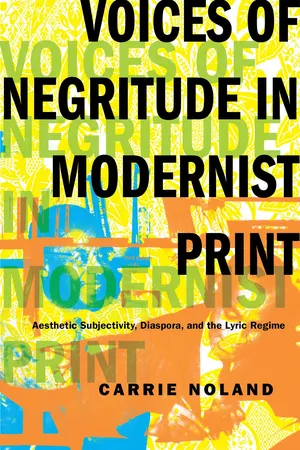
Voices of Negritude in Modernist Print
Aesthetic Subjectivity, Diaspora, and the Lyric Regime
- English
- ePUB (mobile friendly)
- Available on iOS & Android
Voices of Negritude in Modernist Print
Aesthetic Subjectivity, Diaspora, and the Lyric Regime
About This Book
Carrie Noland approaches Negritude as an experimental, text-based poetic movement developed by diasporic authors of African descent through the means of modernist print culture. Engaging primarily the works of Aimé Césaire and Léon-Gontran Damas, Noland shows how the demands of print culture alter the personal voice of each author, transforming an empirical subjectivity into a hybrid, textual entity that she names, after Theodor Adorno, an "aesthetic subjectivity."
This aesthetic subjectivity, transmitted by the words on the page, must be actualized—performed, reiterated, and created anew—by each reader, at each occasion of reading. Lyric writing and lyric reading therefore attenuate the link between author and phenomenalized voice. Yet the Negritude poem insists upon its connection to lived experience even as it emphasizes its printed form. Ironically, a purely formalist reading would have to ignore the ways formal —and not merely thematic—elements point toward the poem's own conditions of emergence.
Blending archival research on the historical context of Negritude with theories of the lyric "voice," Noland argues that Negritude poems present a challenge to both form-based (deconstructive) theories and identity-based theories of poetic representation. Through close readings, she reveals that the racialization of the author places pressure on a lyric regime of interpretation, obliging us to reconceptualize the relation of author to text in poetries of the first person.
Frequently asked questions
Information
Table of contents
- Cover
- Series Page
- Title Page
- Copyright
- Contents
- Acknowledgments
- Introduction
- 1. “Seeing with the Eyes of the Work” (Adorno): Césaire’s Cahier and Modernist Print Culture
- 2. The Empirical Subject in Question: A Drama of Voices in Aimé Césaire’s Et les chiens se taisaient
- 3. Poetry and the Typosphere in Léon-Gontran Damas
- 4. Léon-Gontran Damas: Writing Rhythm in the Interwar Period
- 5. Red Front / Black Front: Aimé Césaire and the Affaire Aragon
- 6. To Inhabit a Wound: A Turn to Language in Martinique
- Conclusion
- Appendix 1: English Translation of Léon-Gontran Damas’s “Hoquet”
- Appendix 2: English Translation of Aimé Césaire’s “Calendrier lagunaire”
- Notes
- Index